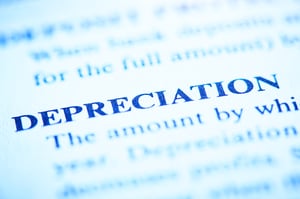Every real estate investor is good at keeping track of the rent received each month, but some end up dropping the ball when it comes to keeping track of expenses.
Not expensing as much as you can could end up being an expensive mistake. According to the legal resource website Nolo.com, every $100 in unclaimed deductions costs the average middle-income landlord $25 in additional federal income taxes.
Let's review which expenses you'll want to keep track of, and how to track them to help keep your taxes as low as the law allows and have more money in the bank.

What Records Should You Keep for Rental Property?
There are several reasons why real estate investors should accurately keep track of the records for a rental property.
In addition to knowing if you are making a profit, accurate records will also help you report the correct amount of taxable net income. Secondly, by having an itemized list of the money coming in and going out, you can strategize on ways to increase your income and reduce your operating expenses.
Categories of Records
Records for a rental property fall into one of two categories:
- An itemized list or report of the income and expenses.
- Backup or supporting documents to prove the income and expenses are true and correct.
Types of Records to Keep
There are a variety of receipts and records to keep when you own a rental property:
- Tenant leases for the current and past tenants, going back several years.
- Legal documents and expense records relating to the leases, such as leasing commissions paid or court fees for an eviction.
- Proof of rental payments received, which are automatically recorded when your tenants pay rent online.
- Bank statements from the account specifically set up for your rental property to track the flow of cash, and to prove that you aren’t commingling business and personal funds.
- Copies of utility bills, receipts for materials and labor, and invoices for supplies and other services that directly relate to the rental property.
- Professional service fee statements from lawyers, accountants, and property managers.
- Advertising and marketing costs connected with filling a vacant property, including online tenant screening and lease preparation.
- Mortgage documents and records of loan payments made.
- Property tax and rental tax statements if your city assesses a sales or use tax for the monthly rent collected.
- Copies of your federal and state tax returns going back several years.
Most small rental property investors aren’t large enough to have salaried employees. If you are, you’ll need to keep track of salaries, benefits, employee taxes withheld, and taxes paid by the employer.

Are Your Expenses True and Correct?
Sometimes real estate investors hire a relative, friend, or business associate to help manage and maintain a rental property.
While there’s nothing wrong with keeping everything in the family, so to speak, be sure that the service charges are reasonable and at market. For example, if the going rate for tree trimming is $100 per tree and you pay $500 each, eventually the tax collector may begin to ask questions.
How to Track Rental Property Expenses
There are a lot of pieces of paper to keep track of to accurately report your rental property expenses. If you’re just beginning to build your rental property portfolio and only own one or two rental homes, you may decide that a simple spreadsheet is sufficient.
However, there are a lot of benefits to using an online system to track your rental property expenses, especially when some of the best online property management software is absolutely free.
Income and Expense Worksheet
Income and expense worksheets like this one are free, easy to use, and customizable for the unique needs of your rental property business. The spreadsheet is available in Excel or Google Sheets formats, and is designed for investors with one to ten rental properties.

Personal and Business Accounting Software
Personal accounting programs such as Quicken, QuickBooks Online, Xero, FreshBooks, and Wave are a few ways some rental property owners choose to manage their books.
The main issue with these solutions is they're not purpose built for rental property businesses. You'll find they require detailed setup process for rental properties, which includes creating individual property profiles, classifying tenants as customers, and establishing a chart of accounts aligned with IRS Form 1040 Schedule E.
That's where the next option can make your life a lot easier (and it's free to get started)...
A Complete Property Management Software
Tools like Stessa were built to help you maximize profits while eliminating the busywork typically associated with owning rental properties.
Trusted by over 250,000 landlords, Stessa helps streamline the record-keeping process so you can stay organized, maximize your tax deductions, and make informed decisions.
You also get features that make the day-to-day management of your properties easier, including:
- Automated income and expense tracking: Instantly sort and classify transactions from linked bank, lender, credit card, and property management accounts, all without additional fees or required add-ons.
- Financial reporting: Generate income statements, net cash flow summaries, and balance sheets (available with the paid Pro plan), among other reports.
- Landlord banking: Open an FDIC-insured high-yield bank account* for each property and easily integrate them with Stessa’s financial tracking features.
- Rental applications and tenant screening: Use Stessa’s tenant screening services and free rental applications to find and select qualified tenants.
- eSigning (in partnership with DocuSign): Upload your document, tag it for digital signatures, and send it to tenants, vendors, partners, and others.
- Free rent collection: Collect rent from tenants through one-time or recurring ACH payments.
- Real-time performance metrics: Get round-the-clock insights into the performance of your property portfolio.
- Property management integration: Link your property management data portal to Stessa to import transactions and get a detailed portfolio overview.
- Unlimited properties: Add an unlimited number of properties to your Stessa account.
- Collaborative access: Invite other investors, CPAs, spouses, and others to share your Stessa account. Manage their access levels to view and/or edit the account.
- Tax resources: Access the yearly Tax Guide and a suite of educational materials created in partnership with The Real Estate CPA to make tax season a breeze.
Experience a more efficient, stress-free way to manage your rental properties. Sign up for a free account with Stessa today.
Reporting Rental Income and Expenses to the IRS
Here’s a summary of the tips from the IRS about tax reporting, record-keeping requirements, and rental property deductions to help real estate investors avoid mistakes.
What is Rental Income?
Rental income is the gross income you receive as rent. In addition to normal rent payments, rental income includes fees for canceling a lease, late fees, property or services received from a tenant in lieu of rent (such as painting the place in exchange for a month of free rent), and landlord expenses paid by the tenant, such as utilities.
Refundable security deposits are not considered to be rental income. However, if a security deposit is used as a final payment of rent, or if part of the security deposit is not refunded to the tenant due to excessive damages or an eviction, the security deposit is considered to be rental income.
What Deductions Can Rental Property Owners Take?
Deductible expenses on a rental property include mortgage interest, property tax, operating expenses, repairs, and depreciation. As a rule of thumb, ordinary and necessary expenses for managing, maintaining, and renting the property are all tax-deductible. This includes items such as materials, supplies, and professional fees.
Property improvements or capital expenses such as replacing a roof or installing a new air conditioning system must be depreciated over a number of years instead of being expensed in full the year the cost is incurred. This IRS article on Tangible Property Regulations provides more information about improvements.
How to Report Rental Income and Expenses
IRS Form 1040 or 1040-SR, Schedule E, Part I is used to report total income, expenses, and depreciation for each rental property. Form 4562 is used to figure the amount of rental property depreciation to use on Schedule E. For more than three rental properties, simply complete and attach as many Schedule Es needed to list the properties.
Note that if your rental expenses exceed your rental income, which may happen with a brand new rental property that is vacant, your annual loss may be limited due to passive activity loss rules and at-risk rules. Refer to Form 8582 Passive Activity Loss Limitations and Form 6198 At-Risk Limitations to learn if your loss is limited.
What Records Should You Keep?
Good rental property records help you monitor property performance, prepare financial statements, identify the source of receipts, track deductible expenses, and prepare tax returns and support items reported on tax returns.
If you are ever selected for an IRS audit, you must be able to document the information reported on your tax return. Documentary evidence includes receipts, canceled checks or bills, and deductible travel expenses directly related to the rental property. If you cannot provide evidence to satisfy the IRS you may be subject to additional taxes and penalties.
Where to Learn More About IRS Rental Property Tax Rules
The following links provide more information about the IRS rules and regulations for rental real estate:
- IRS Tips on Rental Real Estate Income, Deductions, and Rental Recordkeeping
- Know the Tax Facts About Renting Out Residential Property
- IRS Publication 527 Residential Rental Property
- IRS Publication 946 How to Depreciate Property
- Single Member Limited Liability Companies (LLCs)









